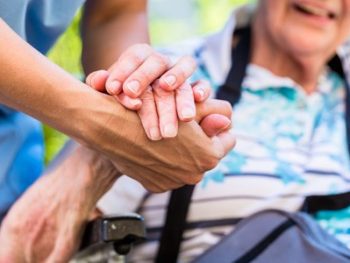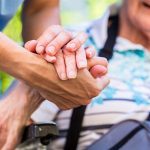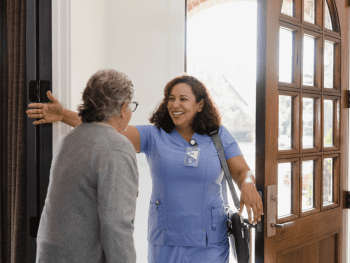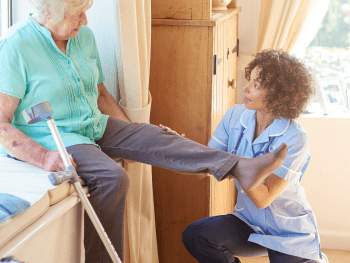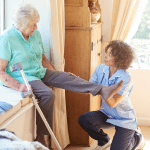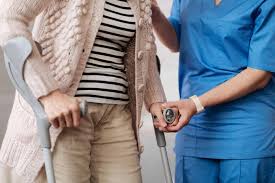
Pemi-Baker Community Health is partnering with the Central NH Regional Public Health Network (RPHN) to bring COVID-19 vaccine to homebound patients within their 22 town service area. This unique collaboration is just one example of many partnerships the Central NH RPHN has throughout the region addressing complex public health issues.
The Central NH RPHN is one of 13 regional public health networks funded by the New Hampshire Department of Health and Human Services (DHHS) to convene, coordinate, and facilitate an ongoing network of partners to address the delivery of public health services. Services can include: public health emergency preparedness, substance use disorder, and other disease prevention and health promotion activities to improve population health and community resilience.
Angel Ekstrom, the Central NH Public Health Network Coordinator, has been instrumental in coordinating partners to vaccinate homebound residents throughout the region reaching the most vulnerable. “Partnering with home health care agencies to vaccinate residents who are homebound affords homebound vaccine recipients to receive their vaccine from a familiar and trusted healthcare provider who, in many cases, regularly enters the recipient’s home. For those who are not clients of the home healthcare provider it connects homebound recipients to available services they may need” says Ekstrom.
 Through Central NH RPHN COVID-19 response efforts, Angel has collaborated with partners across sectors in providing situational awareness, aiding partners in obtaining Personal Protective Equipment (PPE), standing up and demobilizing an Alternative Care Site (ACS), coordinating and operating mobile vaccine clinics addressing inequities, securing vaccine to meet Central NH RPHN needs and recently this partnership with PBCH to administer COVID-19 vaccine to homebound residents.
Through Central NH RPHN COVID-19 response efforts, Angel has collaborated with partners across sectors in providing situational awareness, aiding partners in obtaining Personal Protective Equipment (PPE), standing up and demobilizing an Alternative Care Site (ACS), coordinating and operating mobile vaccine clinics addressing inequities, securing vaccine to meet Central NH RPHN needs and recently this partnership with PBCH to administer COVID-19 vaccine to homebound residents.
“We are very excited to offer vaccines to our homebound patients and their caregivers. We have been compiling a list of our own patients who cannot leave their homes to travel to a vaccine clinic and 211 NH has also given us names” said Kara Hamill, PBCH Senior Operations Director. Jenn Stewart, Infection Control Nurse, Penny Conlon, RN, Emily Reid, RN and Macayla Noble, LPN have undergone specialized training and have been conducting homebound vaccination clinics for three weeks, vaccinating over 80 people thus far.

To date, Pemi-Baker Community Health is the only Home Health (VNA) agency offering this homebound service in Central NH. “We are honored to collaborate with Angel and the Central NH RPHN and are very proud of the fact that although we have serviced multiple patients with Covid-19, we haven’t had a single Pemi-Baker clinician contract Covid-19 from a patient over the past year. While out in the community our employees have been very diligent following CDC, NH state guidelines and the guidelines that the PBCH Covid taskforce has laid out” said Jenn Stewart, LPN and Pemi-Baker Community Health’s Infection Control Nurse.
If you or a loved one cannot leave the house (homebound) and would like more information about this service please call Pemi-Baker Community Health at 603-536-2232.
~written by Anna Swanson






 Starting at the wrist of one hand, let your thumb and fingers of the other hand softly massage the wrist, and then move across the back of the hand, and continue to gently massage each knuckle and joint of each finger. As you finish, use your fingertips to move in a circle in your palm. Then attend to the other hand. You may also want to lightly rub your palms together or even to softly clap your hands. To massage your head, gently let your fingertips move through your hair (or what you have left of it!). Do this a few times. Then gently tap your fingertips throughout and across your whole scalp, not forgetting the areas around your ears or at the base of your skull down to your neck. This also stimulates the movement of energy in our cranial area.
Starting at the wrist of one hand, let your thumb and fingers of the other hand softly massage the wrist, and then move across the back of the hand, and continue to gently massage each knuckle and joint of each finger. As you finish, use your fingertips to move in a circle in your palm. Then attend to the other hand. You may also want to lightly rub your palms together or even to softly clap your hands. To massage your head, gently let your fingertips move through your hair (or what you have left of it!). Do this a few times. Then gently tap your fingertips throughout and across your whole scalp, not forgetting the areas around your ears or at the base of your skull down to your neck. This also stimulates the movement of energy in our cranial area. For the purpose of focusing and directing your attention, only one is necessary. Use it as the daylight is ending. Simply direct your attention to the light, bringing to mind thoughts of past good times and the joy of affection shared with loved ones. The length of time you do this for does not matter too much, but respect the rhythm of your ability to concentrate easily. This isn’t supposed to be a chore or an assignment! It seems to be more profitable to do this in a quiet time without the distraction of other noise. This can be settling to the soul and bring your day to a peaceful end.
For the purpose of focusing and directing your attention, only one is necessary. Use it as the daylight is ending. Simply direct your attention to the light, bringing to mind thoughts of past good times and the joy of affection shared with loved ones. The length of time you do this for does not matter too much, but respect the rhythm of your ability to concentrate easily. This isn’t supposed to be a chore or an assignment! It seems to be more profitable to do this in a quiet time without the distraction of other noise. This can be settling to the soul and bring your day to a peaceful end.




 Denise is a registered dietitian through the Commission on Dietetics Registration, a board-certified diplomat in Lifestyle Medicine through the American College of Lifestyle Medicine and a preferred provider of Medical Nutrition Therapy (MNT). She is committed to building stronger, healthier individuals, families and communities through individual and group nutrition consultations, telehealth, corporate training workshops, wellness retreats, health, and lifestyle coaching, and speaking engagements.
Denise is a registered dietitian through the Commission on Dietetics Registration, a board-certified diplomat in Lifestyle Medicine through the American College of Lifestyle Medicine and a preferred provider of Medical Nutrition Therapy (MNT). She is committed to building stronger, healthier individuals, families and communities through individual and group nutrition consultations, telehealth, corporate training workshops, wellness retreats, health, and lifestyle coaching, and speaking engagements.
 certain activities that once seemed simple can become more difficult to manage.
certain activities that once seemed simple can become more difficult to manage. nal and physical therapy when he gets home following knee surgery. The nurse can help your Mom learn to manage her medications safely and help her learn ways to manage her overall health more effectively. Occupational and physical therapy will provide training on the best exercises Dad can do to strengthen his knee so he can get back to doing the things he enjoys.
nal and physical therapy when he gets home following knee surgery. The nurse can help your Mom learn to manage her medications safely and help her learn ways to manage her overall health more effectively. Occupational and physical therapy will provide training on the best exercises Dad can do to strengthen his knee so he can get back to doing the things he enjoys. How does a patient access skilled home health thru Pemi-Baker Community Health?
How does a patient access skilled home health thru Pemi-Baker Community Health?



